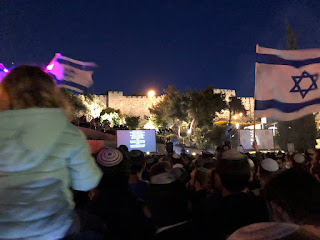A New Independence Day: Yom Haatzmaut in Israel
This week was that of the Fourth of July, and as the entire country celebrated with barbecues and beach days, I thought back to May when I celebrated Israel’s independence day. Yom Haatzmaut, Israel’s independence day, was one of the most telling cultural experiences that I had the opportunity to learn about during my time in Israel, and in the spirit of America’s own independence day, I wanted to share about Israel’s. For America and for most countries, Independence Day is heavily commercialized and is largely an excuse to miss work and be around friends; however, in Israel, Yom Haatzmaut is a part of an entire cultural phenomena of patriotism and love for Israel. Yom Haatzmaut follows one of the saddest and most solemn days in Israel, Yom Hazikaron, which is Israel’s memorial day. Even though America knows it’s own memorial day for the long weekend and store sales, in Israel, memorial day is taken very seriously. Since every person in Israel drafts to the army, everyone knows somebody who has died in the army, and everyone is very affected by the large cultural presence the army plays in Israeli society. Therefore, on memorial day the entire country is visibly downtrodden; most people wear white to honor those who have fallen in the army, and instead of playing songs on the radio, radio stations read off the names of fallen soldiers. The entire country takes this day to seriously honor the fallen Israeli soldiers, but at sundown, the entire dynamic changes. Sundown marks the start of the next day on the Jewish calendar, which is Yom Haatzmaut, Israel’s Independence Day. This transition from one of the saddest days on the Israeli calendar to one of the happiest is truly one of the most disorienting experiences I’ve ever had, but it tells a lot about how Israelis view their own independence and their allegiance to their country. Israelis spend Yom Hazikaron honoring the fallen soldiers of Israel, and the very next day dancing and partying, enjoying the land and state which those exact fallen soldiers gave to them. To go from such an intense sadness to such genuine happiness seems impossible, but both days have something very fundamentally important in common: on both days, Israeli’s honor the fallen soldiers in order to really appreciate living in Israel. I experienced this indescribable transition myself; I spent the afternoon at the military cemetery on Har Herzl, crying over the graves of fallen soldiers, and that same night running through the streets of Jerusalem singing and dancing. The transition was confusing and a bit uncomfortable, but I truly think it explains on a cultural level how much Israelis appreciate their own (young) independence and the soldiers who fell for it.



Comments
Post a Comment